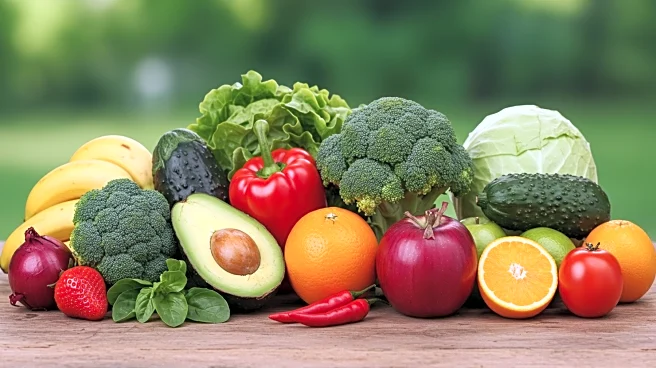What is the story about?
What's Happening?
WK Kellogg Co., known for its popular cereals like Froot Loops and Apple Jacks, has announced plans to remove artificial dyes from its breakfast cereals by the end of 2027. This decision comes amid increasing pressure from the U.S. government and consumers to phase out synthetic colorings from food products. Texas Attorney General Ken Paxton revealed that Kellogg signed a legally binding agreement to permanently eliminate these dyes, following an investigation into potential violations of state consumer protection laws. The company has committed to reformulating its cereals served in schools to exclude FD&C colors by the 2026-27 school year, and aims to completely remove these dyes from its products by the end of 2027.
Why It's Important?
The move by Kellogg to eliminate artificial dyes is significant as it reflects a broader trend in the food industry towards healthier and more natural ingredients. Synthetic dyes have been criticized by health advocates for potentially causing neurobehavioral issues in children, despite FDA assurances of their safety. Kellogg's decision aligns with consumer demand for transparency and healthier food options, potentially influencing other major food manufacturers to follow suit. This shift could impact the market dynamics, with companies investing in alternative natural colorings and reformulating products to meet new health standards.
What's Next?
As Kellogg progresses towards its goal of removing artificial dyes, other food manufacturers may face similar pressures to reformulate their products. The agreement with the Texas Attorney General could set a precedent for other states to pursue similar actions, potentially leading to nationwide changes in food manufacturing practices. Companies may need to invest in research and development to find suitable natural alternatives, which could affect production costs and pricing strategies. Additionally, consumer advocacy groups may continue to push for stricter regulations on food additives, influencing future policy decisions.
Beyond the Headlines
The elimination of artificial dyes from Kellogg's cereals could have broader implications for public health and consumer trust in food products. As awareness grows about the potential health risks associated with synthetic additives, consumers may increasingly demand cleaner labels and transparency from food manufacturers. This trend could lead to a cultural shift towards prioritizing health and wellness in food choices, impacting marketing strategies and product development across the industry.
















